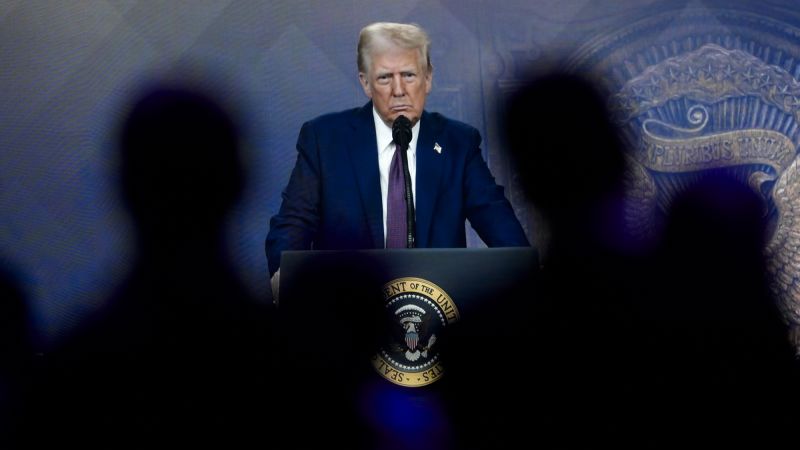New York
In case any corporate executives were sitting around this week wondering what the next four years might look like, a pretty telling moment at Davos should offer them a sense of what it means to do business in the era of Trump 2.0.
ICYMI: Davos, aka the annual World Economic Forum confab in the Swiss Alps, brings together the world’s leading figures in business, tech, investing and economics. (Think long days of academic panels followed by chummy cocktails and steak and the most elite corporate scuttlebutt on the planet.)
Naturally, President Donald Trump’s keynote he video-conferenced from Washington was well attended. But it wasn’t Trump’s vision for lower corporate taxes or tariffs that dominated Thursday’s happy hour, according to the New York Times’ Lauren Hirsch.
Instead, the chatter centered on Brian Moynihan, the CEO of Bank of America, who thought he was teeing up a softball for the president but soon found himself in Trump’s crosshairs. What happened next was a public berating of one of the most powerful financiers in the world a warning shot to the private sector, direct from Trump’s mouth: The administration won’t stand for “woke” ideology in the ranks of the federal government, and companies had better get on board, too.
During a Q&A session, Trump touted his plans to reduce inflation before abruptly shifting the focus back to Moynihan.
“You’ve done a fantastic job, but I hope you start opening your bank to conservatives, because many conservatives complain that the banks are not allowing them to do business within the bank,” Trump said. “You and Jamie and everybody… What you’re doing is wrong.”
Jaws hit the floor, the Times reported.
What Trump was referring to is an allegation that major lenders, including Bank of America and JPMorgan Chase (run by Jamie Dimon), have been “debanking” conservative and religious groups over their politics. Both banks have repeatedly denied the claim, which became a right-wing talking point last spring after more than a dozen state auditors and treasurers wrote an open letter to Moynihan, citing a few examples in which right-wing or religious organizations’ accounts were shut down. (BofA previously stated those instances were unrelated to any political or religious leanings.)
Bank of America spokesperson Bill Halldin reiterated to on Thursday that the bank serves 70 million clients, including conservatives, and has “no political litmus test.” And JPMorgan representative Patricia Wexler said in a statement: “We have never and would never close an account for political reasons, full stop.”
The point of Trump’s jab at Moynihan was not to stand up for a handful of groups that had to change banks. The point was to send a warning to every executive in the room, and everyone watching the livestream around the world, that any slight real or imagined against his base won’t be tolerated.
It’s a stunning shift for a Republican Party that, up until recently, embraced a laissez-faire approach to business.
For decades, conservative orthodoxy bristled at any sign of government meddling in corporate affairs, whether through federal regulations or corporate taxes. But the calculus has changed in line with Trump’s carrot-and-stick philosophy: Sure, we’ll slash your taxes but it’ll cost you.
The “debanking” claim echoes a broader sense among some on the right who believe they are victims of a left-wing agenda that has taken root in Corporate America. A string of perceived injustices have snowballed into an active campaign at first on social media, now from the White House against diversity, equity and inclusion initiatives.
Bud Light may not have caused the backlash, but its brief 2023 ad partnership with a trans influencer poured lighter fluid on the right’s simmering resentments. After a single piece of sponsored content showed up on Instagram, conservative influencers and media blew the story up into a conspiratorial narrative about the creep of “woke” culture into everything. It wasn’t just the coastal elites with their pronouns and porous borders this was Budweiser. The King of Beers, suddenly standing with the LGBTQ+ community.
Even as Bud Light capitulated and tried to walk back the ad spot, consumers revolted and the brand lost more than $1 billion in sales in the year that followed.
Since then, dozens of brands Walmart, Ford and Target, to name just a few have seemingly caved to right-wing activists by announcing rollbacks to their DEI programs. Many of those “wins” are overstated by the activists, as many of the companies, like McDonald’s, have simply tweaked the language they use rather than alter their operations.
Still, with Trump’s ascension to the presidency, the DEI backlash has graduated from a social media campaign by a handful of rabble-rousers to the official policy of the federal government. This week, Trump signed executive orders clawing back federal DEI programs and even ordered government agencies to investigate such efforts at publicly traded companies.
It wasn’t immediately clear how many people would be laid off as a result, though dozens have already been placed on administrative leave. The former acting head of the Office of Personnel Management, Rob Shriver, told NPR that “given the broad brush that they have painted, it’s potentially very large numbers of people.”
Not all companies are ready to throw in the towel, of course.
On Thursday, Costco shareholders voted overwhelmingly against a proposal from a conservative think thank that would have compelled the retailer to quantify the risks of maintaining its DEI initiatives. Apple rejected a similar proposal this month. And even JPMorgan Chase not exactly a bastion of liberalism on Wednesday seemed to draw a line in the sand. Dimon, asked by CNBC about activist pressure to abandon DEI, stood firm, stating: “Bring them on.”
